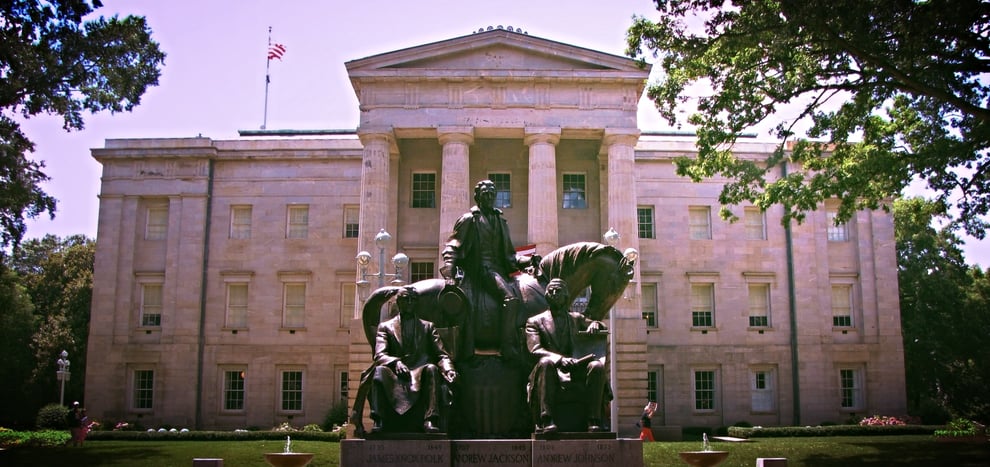
Ending the longest legislative session in 13 years, the North Carolina General Assembly adjourned on Wednesday, Sept. 30. It was a busy, and contentious, session for the advanced energy industry, and results were mixed. Due to the tireless efforts of the North Carolina Sustainable Energy Association (NCSEA), AEE’s partner in the Tar Heel State, the state’s Renewable Energy and Energy Efficiently Portfolio Standard remains intact. But a tax credit that has made North Carolina a national leader in solar power development was allowed to lapse after this year.
AEE joined NCSEA in fighting a pitched battle to extend North Carolina’s Renewable Energy Investment Tax Credit (REITC). Despite these efforts, on Friday, September 18, the state budget – sans REITC -- received its final vote of approval and Gov. Pat McCrory signed the spending plan into law. The legislature did subsequently amend the “Safe Harbor” provision of the REITC, which originally passed in April, to ensure that projects for which “at least the minimum percentage of the physical construction of the project was constructed” by the end of this year would retain eligibility for the expiring tax credit.
NCSEA issued a statement that reads, in part: “By allowing the credit to sunset at the end of the 2015, the legislature has sent a clear message to countless clean energy workers, investors, businesses and customers that North Carolina is looking to roll back the clock on $4.7 billion in net positive economic impact and squander one of our state’s greatest economic opportunities of this decade and the next.”
NCSEA and AEE did rally broad business community support to defend the state’s primary policy for advanced energy growth, the Renewable Energy and Energy Efficiently Portfolio Standard (REPS) against attack. That effort included a high-profile letter to legislative leaders from tech giants Apple, Facebook, and Google, which have all recently built data centers in the state: “As global companies providing services to consumers around the world from our operations in the state, a reliable, sustainable electricity supply is critical, and requires sourcing power from renewable energy. In fact, the right and ability to access power from renewable resources is not merely a goal, but an expectation.”
Besides maintaining REPS, advanced energy was a winner in extending PACE financing authorization for five years, as well as maintaining property tax abatements for solar installations.
Some other bills will remain eligible for next year’s Short Session, which convenes April 25. Among these is HB 245, a bill to allow third-party sales of renewable energy. This would offer renewable energy as a choice to customers ranging from corporations, large institutions, and military installations to private homeowners. In the meantime, the existing utility monopoly on sale of electricity to end-users is under challenge in a test case before the North Carolina Utilities Commission. NC WARN, a nonprofit clean energy advocacy group, paid for the installation of a 5 kW solar array on the roof of Faith Community Church in Greensboro, and began selling electricity to the church at a rate below grid power from utility Duke Energy. NC WARN then filed a request for “declaratory ruling” from NCUC approving this arrangement. NCUC has issued a scheduling order in the proceeding (PowerSuite users can follow it here), asking for comment on the Commission’s authority to allow third-party sales of electricity. Comments are due Oct. 30.
Also still in the legislative hopper for next year’s Short Session is HB 571, a bill that would dictate the way North Carolina would comply – or attempt to – with EPA’s Clean Power Plan. A version of the bill passed by the House simply required a stakeholder process leading to submission of a state compliance plan. But the Senate passed a version requiring the state to sue EPA over the federal rule, and also limiting the measures contained in a state compliance plan to efficiency improvements in existing coal-fired power plants – ruling out so-called “outside the fence line” measures for reducing emissions, most of them advanced energy technologies and services. As power plant improvements would be insufficient to meet EPA’s target for North Carolina, EPA would be forced to impose a federal plan to make up the difference. The power-plant-only bill sat in the House, awaiting concurrence, until the end of the session. It’s unclear whether the House has any appetite for this wrong-headed approach to the Clean Power Plan, but even if the bill moves in the Short Session, submission of an initial state plan by the September 2016 deadline would sidestep the current intent of the bill.
In all, 2015 was a mixed session for advanced energy, but the legislative results were far better for the efforts of NCSEA and its many allies in fighting for better policies. At NCSEA’s annual Making Energy Work conference in Raleigh, Rep. John Szoka (R-Cumberland), who received the group’s “Excellence in Public Policy” award, told the audience, “your involvement made a big difference, but you have to do more – a lot more!”
Keep track of bills moving through the North Carolina legislature, and all the other ones as well. Sign up today for a free PowerSuite trial.
